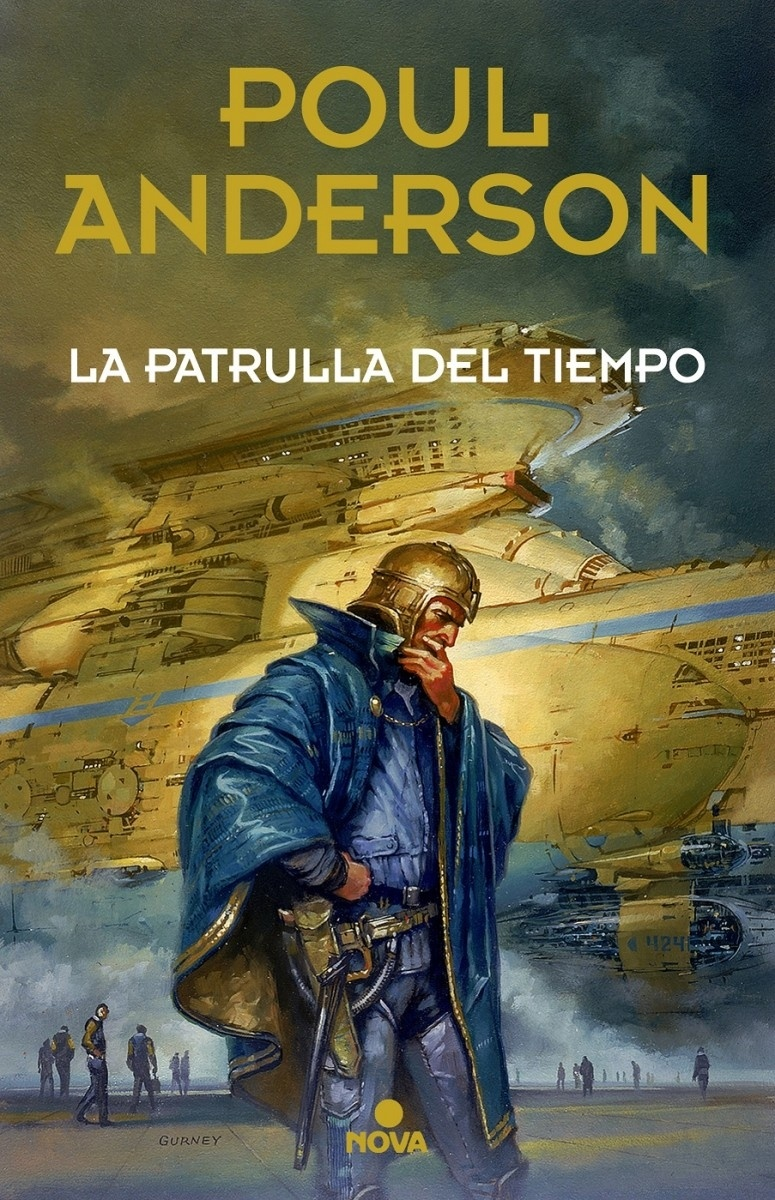His Richest Text?
The Richness Of "Star Of The Sea"
Poul Anderson's "Star of the Sea" is such a rich narrative because it combines, indeed almost seamlessly blends, mythological writing not only with historical fiction but also with the dramatic presentation of a subtle time travel paradox.
In the preceding Time Patrol installment, "The Sorrow of Odin the Goth," Carl Farness learns that it was he himself that had appeared as Odin and betrayed his followers. Now, in "Star of the Sea," Janne Floris learns that it was she herself that had been perceived by the prophetess, Veleda, as her inspiring goddess. Traveling into the past to find the crucial event, she causes the event.
Before that (before in terms our reading order), section 1 ends when a prisoner repeats the sibyl's prophecy that the Roman Empire is doomed and section 2 begins when Manse Everard arrives in Amsterdam in "...the closing decades of the twentieth century..." (p. 477) Thanks to the wonders of time travel, Everard is coming to the rescue of the Roman Empire nearly two millennia earlier. Even in an invariable timeline, for Everard to learn millennia later of an action that he must perform millennia earlier is a possible sequence of events but this timeline is variable. Whatever the explanation, it is possible that Everard will remember having traveled into the past from one version of the twentieth century yet will return from the past into an alternative version. Can goddess-worship prevent the acceptance of Christianity in Northern Europe?

13 comments:
Kaor, Paul!
Even if someone does not believe in the actual, literal supernatural origins of Christianity (and I do believe in those supernatural origins), it's hard to imagine any kind of real paganism surviving the challenge of a faith like Christianity. Intellectually, philosophically, theologically, and morally, paganism is a very thin and weak substitute for a tradition as old and SUBSTANTIAL as Judaeo/Christianity.
IMO, the only real pagan religion surviving today is Hinduism, and only in India has it remained more or less dominant. And, when considered simply in its basics, a pantheon of gods, it can't be taken very seriously.
Sean
Sean,
When Christianity entered Northern Europe, it represented a more powerful culture. Christianity, prophetic from the beginning, had to adopt pagan philosophies whereas Buddhism, both spiritual and philosophical from the beginning, developed its own philosophical systems.
I am unimpressed with Thomism as an intellectual system.
Paul.
Kaor, Paul!
And I don't believe merely cultural factors, which I believe existed, accounts wholly for the conversion of the Scandinavians/Germans. Rather, belief in the supernatural origins and teachings of Christianity was the ultimate cause for that conversion lasting.
You know my view, Buddhism is more a philosophy, not a religion. And I have no objection to Christianity learning from Platonism and Aristotelianism.
Sean
Sean,
Buddhism is a philosophy (an analysis of life) and a religion (a response to transcendence). But its transcendent is not a person.
Paul.
Hinduism is the last of the great Indo-European paganisms still standing, but it's mutated a great deal -- which is a continual embarrassment to modern Hindus, because their religion isn't much like that of the the beef-munching, booze-swilling, animal-sacrificing charioteer chieftains depicted in the Rig-Vedas. Even the names of the gods have changed a lot.
At its more ethereal at the highest level, a sort of Platonic monotheism, but as experienced by most worshippers it's a straightforward polytheism.
I have an image of Ganesh over my front door, btw.
Kaor, Paul and Mr. Stirling!
Paul: to ME, for a religion to be a religion, it has to teach the worship of God, a god, or gods. I still think of Buddhism as simply a philosophy.
Mr. Stirling: Exactly! The most ancient Hindu sources, such as the Rig-Vedas, are simply not what most Hindus mean TODAY by "Hinduism." The Rig-Vedas have more in common with the gods of those Indo/Europeans who invaded Europe.
And considering how late the more "ethereal" aspects of "philosophical" Hinduism is, I find it hard to really take it very seriously considering how actual worshipers are plain and simple polytheists.
Sean
Sean,
Religion is response to transcendence. Theism is personification of transcendence, therefore is one kind of religion. Non-theistic religions are Jainism, Buddhism, Taoism and the Hindu Samkhya System.
Jainism and Samkhya are atheist but soul pluralist. By practicing asceticism or yoga, souls aim to transcend reincarnation. This is a religion.
Paul.
Kaor, Paul!
It still seems odd and rather implausible to think of "transcendence" not being oriented or focused on God or "gods."
Sean
Sean,
The transcendent is That which is beyond. It is anthropomorphic to personify It.
Paul.
Kaor, Paul
Not if you believe a God exists.
Sean
Sean,
Of course not but we are talking across this gulf between theistic and non-theistic belief.
Paul.
Kaor, Paul!
Understood. I simply find non-theistic "transcendence" hard to grok, to use a word coined by Heinlein!
Sean
Sean,
Because it transcends our understanding.
Paul.
Post a Comment